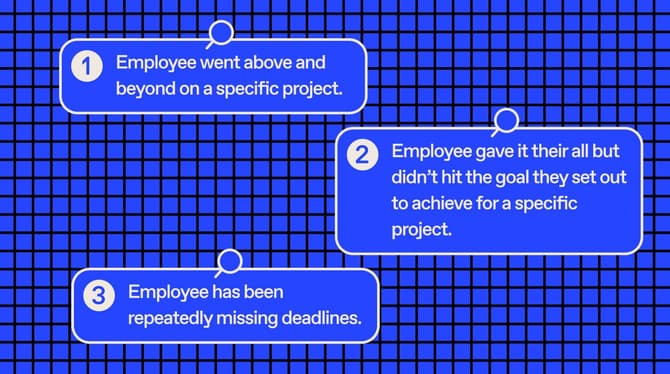How do you get ahead of employee turnover?
It can be tough when someone leaves your team — and even tougher when you didn't see it coming. You might have regular 1-on-1 meetings, send out employee engagement surveys, and frequently ask for open-ended employee feedback. But even still, it isn't always easy to spot when people are looking for new opportunities.
So what's the best way to retain your top talent? Having a stay interview with each employee on your team is a great place to start. This helps you understand what's really keeping them in their job, and what you can do to stay competitive in a fierce market.
In this article, you'll learn:
Why do employees stay at their jobs, really?
We conducted our own stay interviews with a few employees who are happy, engaged, and staying put in their current jobs, to understand what's behind their satisfaction. Here's what they had to say.
1. Trust and autonomy
Employees want to feel like their manager trusts them to do what they do best, with the best interest of the company at heart. You hired them for their skills, so give them the space to apply themselves and try new things.
"I'm taking the lead on so many projects, and I see friends in the same field doing the same things who have 10 years of experience. I only have 3, almost 4 years and I'm able to do so much, I'm able to take risks."
"They trusted me so much from the beginning."
Beatriz Godoy, Talent Acquisition Manager at Osedea
2. A great manager
Managers are at the heart of employee success, and employees want someone who really supports them. Continuously working on your management skills is key to keeping your team intact.
"My manager brings goals, objectives, and really clear roles for all of us. She's implemented a lot of guidelines and procedures that help us really mainstream our processes and work more efficiently."
"What I love about her is that she follows up with me every month, not just about work but about my personal goals, and she tries to fit them into my work."
Paola Yannine Perez Palacios, Undergraduate Admissions Officer at Concordia University
3. Challenge and purpose
Feeling a sense of satisfaction at the end of the work day can be a big driver of engagement. Employees want to feel like they're contributing in a meaningful way and applying themselves to something that they feel really matters.
"Every day involves a variety of problems that need to be solved. It's definitely challenging but there's a nice level of satisfaction when everything is processed correctly. I'm working on employee's pay files every day."
"It's nice to know that I'm helping employees get the pay they deserve."
Faisal Al-Baghdadi, Compensation Advisor at Public Services & Procurement Canada
What is a stay interview?
When an employee has decided to leave your team, you might conduct an exit interview to better understand their departure. But before it gets to that point, you can have stay interviews with your current employees to better understand what's keeping them on your team or at your company. This way you can be proactive and reduce employee turnover before it's too late.
Why are stay interviews important?
The knowledge you gain from a stay interview helps you implement a retention strategy that's really answering employee needs. These conversations are a way to dig deeper into the employee experience and understand what peoples' jobs mean to them. And in the midst of a Great Resignation, there's no better time for employers to amp up their efforts to keep star performers on their teams.
Before the mass shift to remote work, we already knew it wasn't a ping pong table or healthy snacks that kept your most skilled workers around.
Employee engagement and job satisfaction go far deeper than that. Every person at your organization has their own motivators and ambitions, their own personal values and perspectives. These human factors play a big role in how people approach work, how they collaborate with others, and what makes them eager to log in in the morning.
Who should conduct a stay interview?
Even if your human resource team or upper leadership conducts regular surveys or interviews to inform workplace policy and perks, managers should be having stay interviews with each team member on a regular basis. It's the manager who has the most direct impact on an employee's day-to-day.
The employee experience begins and ends with the manager. [...] And whether organizations want to improve the culture, increase employee engagement, strengthen wellbeing or improve relationships with customers, it all hinges on the quality of the managers.
How Influential Is a Good Manager? from Gallup
So don't wait for company-wide retention efforts to schedule stay interviews with your team. Schedule a one-on-one with each employee and send over a few talking points ahead of time so they know what to expect.
Plan, schedule, and follow up on every one-on-one meeting with Officevibe. The software stores all of your meeting notes in one place and lets you plan agendas together with employees. Set action items that carry over as talking points in your next meeting, so nothing slips through the cracks.
How to conduct a stay interview
There are different approaches you can take to your stay interview. You might ask different stay interview questions depending on your relationship with the employee, how long they've been at the company, what their role is, or other factors. Here are a few to get you inspired about what you might want to ask.
Questions to ask in a stay interview
- What's the best part about working on this team?
- Do you feel adequately supported in your professional development?
- Where do you want to be in your career 2 years from now?
- Do you see yourself achieving your career goals in your current role?
- How does the team dynamic influence your day-to-day?
- Is there anything you wish you got from your job that you don't?
Stay interviews are the first line of defence against employee turnover
Whether you've been hit with a turnover wave, you're trying to get ahead of one, or you just want to put a solid retention strategy in place, stay interviews are always worth having. The most important thing is that you take the information you get from them and use it to strengthen and improve employee satisfaction on your team. Schedule stay interviews every 3-6 months to make sure you're staying on top of what's engaging people, and taking a proactive approach to employee retention.
Equip HR and managers with tools to engage, recognize, and drive performance.




